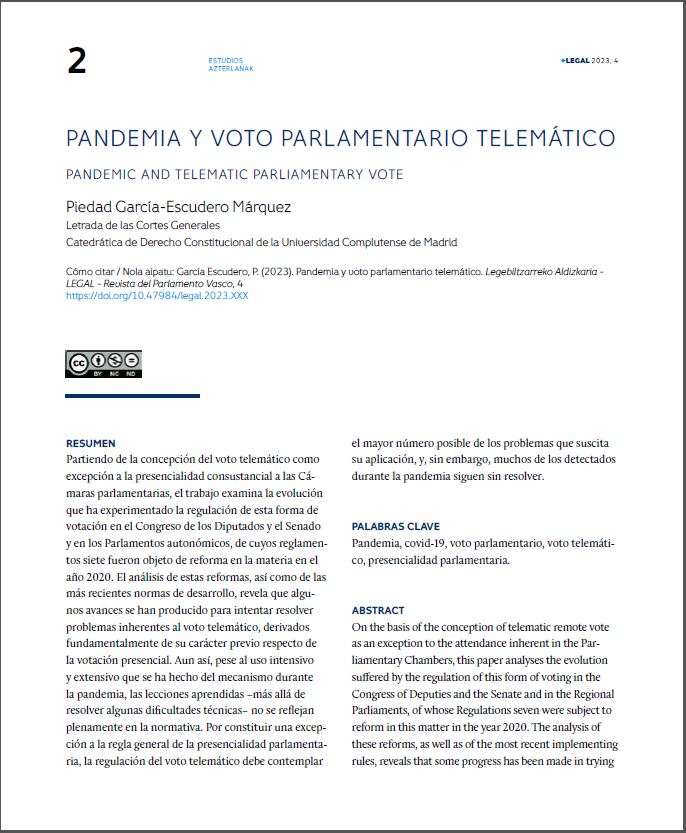Abstract
On the basis of the conception of telematic remote vote as an exception to the attendance inherent in the Parliamentary Chambers, this paper analyses the evolution suffered by the regulation of this form of voting in the Congress of Deputies and the Senate and in the Regional Parliaments, of whose Regulations seven were subject to reform in this matter in the year 2020. The analysis of these reforms, as well as of the most recent implementing rules, reveals that some progress has been made in trying to solve problems inherent to telematic vote, derived mainly from being prior to the in-person voting. Even so, despite the intensive and extensive use of the mechanism during the pandemic, the lessons learned –beyond solving some technical difficulties– have not been fully incorporated into the rules. As an exception to the general rule of parliamentary attendance, the regulation of telematic voting should cover as many problems as possible that arise from its application, yet many of those identified during the pandemic remain unresolved.
References
García-Escudero Márquez, P. (2010). Voto parlamentario no presencial y sustitución temporal de los parlamentarios. Corts: anuario de derecho parlamentario, 24, 81-114. Recuperado de https://dialnet.unirioja.es/descarga/articulo/3427316.pdf
García-Escudero Márquez, P. (2020a). Actividad y funcionamiento de los Parlamentos españoles en la crisis sanitaria por COVID-19. En D. Barceló Rojas, S. Diaz Ricci, J. García Roca y M. E. Guimaraes Teixeira Rocha (Coords.). Covid-19 y parlamentarismo: los parlamentos en cuarentena (pp. 156-173). México: UNAM.
García-Escudero Márquez, P. (2020b). La ductilidad del derecho parlamentario en tiempos de crisis: actividad y funcionamiento de los Parlamentos durante el estado de alarma por COVID-19. Teoría y Realidad Constitucional, 46, 271-308. https://doi.org/10.5944/trc.46.2020.29113
García-Escudero Márquez, P. (2022a). El debido retorno del Parlamento a los hábitos prepandemia. En J. Tudela y M. Kölling (Eds.). Calidad democrática y Parlamento (pp. 347-373). Madrid: Fundación Manuel Giménez Abad; Marcial Pons.
García-Escudero Márquez, P. (2022b). ¿Es constitucional el voto por delegación en los Parlamentos autonómicos? Comentario a la Sentencia del Tribunal Constitucional 65/2022, de 31 de mayo. Recurso de amparo núm. 2388-2018. (BOE núm. 159, de 4 de julio de 2022). Revista de las Cortes Generales, 114, 559-575. https://doi.org/10.33426/rcg/2022/114/1712
Ortea García, E. (2021). Cortes Generales y emergencia sanitaria: labor parlamentaria en un contexto distópico. Zaragoza: Fundación Manuel Giménez Abad. Recuperado de https://www.fundacionmgimenezabad.es/es/publicaciones/cortes-generales-y-emergencia-sanitaria-labor-parlamentaria-en-un-contexto-distopico
Rubio Núñez, R. (2020). La tecnología en el Parlamento durante la crisis del COVID-19. Cuadernos Manuel Giménez Abad, monografía 8, 226-236. Recuperado de https://www.fundacionmgimenezabad.es/es/documentacion/la-tecnologia-en-el-parlamento-durante-la-crisis-del-covid-19

This work is licensed under a Creative Commons Attribution-NonCommercial-NoDerivatives 4.0 International License.
Copyright (c) 2023 Piedad García-Escudero Márquez

